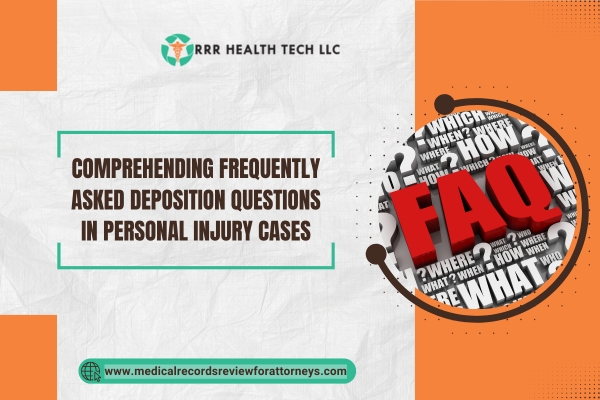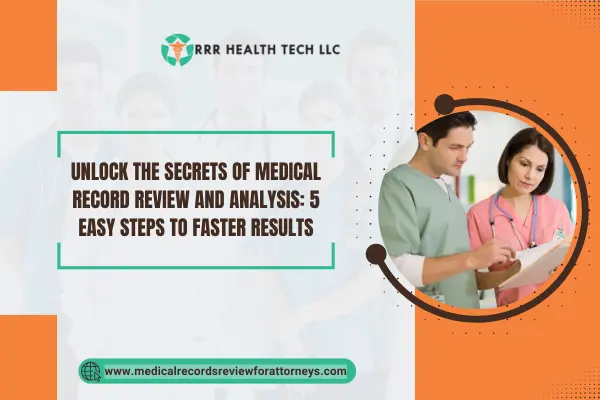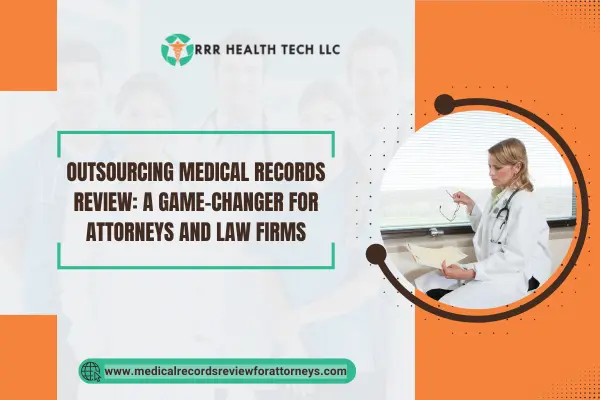
I. Introduction
For personal injury lawyers, reviewing and analysing medical records and deposition questions is skill that, if done effectively, can make or break a case. This goes a long way not just in ensuring that a robust argument is made but that the clients get value for their money.
II. Medical Records and Other Legal Documents
Medical records are, without a doubt, the most important documents in personal injury claims. They procure:
• Evidence of Injury: A medical record provides evidence of the type and severity of injuries sustained.
• Treatment History: A medical record contains information on the steps taken to treat an illness and their effects.
• Impact on Life: A medical record displays the impact the injuries have had on the client’s life and ability to work.
III. Common Deposition Questions
What is a deposition?
Depositions are the procedure in which a witness answers questions from the opposing side under the oath. In a case involving personal injury, depositions help in getting information from a client and medical personnel.
How does a medical record affect a deposition?
Medical records usually have an impact during the deposition. They can provide a basis for questions and assure or contest the testimony given by the witnesses.
What should attorneys be cautious about regarding a patient’s medical record?
Attorneys need to pay attention to:
• Coherence: Check if the records correspond with the client’s narrative.
• Particulars: Search for particular comments on treatment modalities and patient interactions.
• Prior Injuries: Determine any past medical conditions that may be relevant to the case.
How many variations in medical record documentation impact a case?
Inconsistencies can sometimes result in:
• Lack of Trust: Clashing documents may put the believability of the client’s statement into question.
• Legal Issues: The opposing lawyer may use contradictions to make the case less compelling.
What are some tips for effectively reviewing a patient’s medical record?
For a comprehensive review, an attorney should:
• Take a Methodical Review Plan: Formulate a checklist that will assist in the review.
• Get a Non-Legal Consultant: Get a doctor to explain difficult medical terms.
• Arrange Files: Make sure all files are properly organized to facilitate easy access during depositions and trials.
IV. Best Practices for Medical Records Review
A structured approach to medical records review can enhance the effectiveness of legal strategies. Here are some best practices:
• Initial Evaluation: Target specific objectives while conducting a global review of the medical records.
• Step-by-Step Examination: Review each document for information and track every detail, including inconsistencies and omissions.
• Teamwork: Consult medical experts for any vague words or treatment orders that require further explanation.
• Recording: Guarantee logbook accurateness to aid in remembering depositions and trial preparation.
V. Current Trends and Statistics (2024)
As of 2024, the landscape of medical records review is evolving. Recent statistics indicate that:
- Increased Use of Technology: More attorneys are utilizing software tools for efficient document management and analysis.
- Rising Importance of Telehealth Records: With the growth of telemedicine, attorneys must now consider virtual consultations and their documentation.
- Focus on Patient Privacy: Compliance with HIPAA regulations remains paramount, necessitating careful handling of sensitive information.
VI. Case Studies
Case Study 1: Smith v. ABC Corporation
• Brief Description of The Case: A client got injuries from an occupational accident resulting from defective machinery.
• Challenges: The initial medical reports contained superficial information about the injuries.
• Solutions: The attorney sought the services of a medical professional who was able to analyze the records and provide critical treatment information that was previously hidden.
Case Study 2: Johnson v. XYZ Insurance
• An Overview of the Case: A client needed a compensation claim for injuries he had suffered due to a car accident.
• Challenges: Missing pieces in the medical records brought into question the degree of the injuries.
• Solutions: The attorney performed a comprehensive analysis and tracked down the missing records, as well as acquiring further needed evidence from the provider’s office.
VII. Conclusion
In summary, an exhaustive review of medical records should be done in detail for lawyers dealing with personal injury cases. The understanding of medical records and the Corrections of quasi-medic deposition interrogatories combined with best practices can improve legal outcomes. These insights, together with the most recent trends and case studies on practice, serve to highlight the importance of this process in the field of law.


